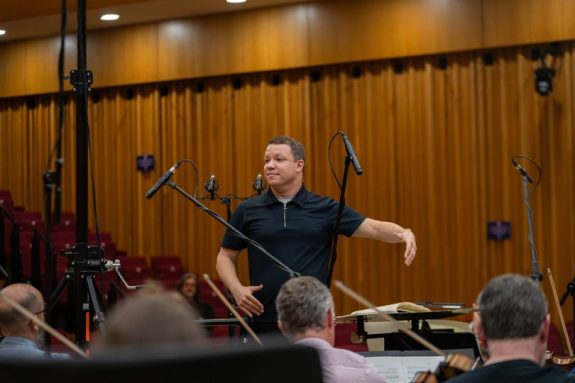 United Kingdom Barber, Ives: Benjamin Baker (violin), BBC National Orchestra of Wales / Ryan Bancroft (conductor). Hoddinott Hall, Millennium Centre, Cardiff, 4.5.2024. (PCG)
United Kingdom Barber, Ives: Benjamin Baker (violin), BBC National Orchestra of Wales / Ryan Bancroft (conductor). Hoddinott Hall, Millennium Centre, Cardiff, 4.5.2024. (PCG)

Barber – Adagio (1936, arr. 1938); Violin Concerto (1939, rev. 1948)
Ives – Symphony No.2 (1902)
It is always good to be reminded how important live performances are to music in an age when those who love the classical repertory have to subsist more and more on recordings, however excellent, designed to be played in the home. We had just such an example at the beginning of this concert: Ryan Bancroft conducted Barber’s hackneyed Adagio for strings. This perennial favourite was originally the slow movement of a string quartet. Barber rescored it for string orchestra at the request of Arturo Toscanini, who premiered it in 1938 with the full string section of his National Symphony Orchestra.
In later years, smaller chamber orchestral forces usually played it. That is eminently practicable since the conversion of string quartet to orchestral score involves little elaboration. But here we got the full strength of the BBC National Orchestra of Wales, complete with eight cellos and six double basses. Paradoxically, the quieter passages gained a hushed intensity of feeling apparent from the beginning at a heart-breakingly slow speed which progressively gathered weight towards a climax, emotionally wrenching and explosive. The silent pause at the heart of the movement has never felt so pregnant. This was a very special performance. Its life-affirming magnitude completely made the listener forget any reminiscences of tawdry pop treatments of Barber’s gently meandering melodic lines.
Barber’s Violin Concerto screwed up the tension still further. The lovely slow movement launched by Steve Hudson’s oboe was properly plangent. Bancroft was willing to build the lush romantic textures and soaring melodic lines in an emotionally drenched manner which mirrored Barber’s harmonies. Benjamin Baker began rather tentatively, emphasising the delicacy and fragility of the violin line rather than the big-boned strengths that Barber seems to have expected. But the results were well considered and highly engaging. I am sure that the recorded balance when the concert is broadcast will give the performance more immediacy. Baker rose to the challenge of Bancroft’s orchestral climaxes in the slow movement, and his quicksilver delivery of the sparkling finale left nothing to be desired. He followed up, with a nod to the American music elsewhere in the programme, with a jazzy Louisiana Blues Strut by the delightfully named Coleridge-Taylor Perkinson. Heartfelt thanks to the soloist for telling the audience what he was going to play.
After the interval, Ryan Bancroft rang yet another change on the theme of American music. Charles Ives’s Second Symphony is in many ways a piece in transition from the conventional style of the First Symphony to the iconoclastic music for which Ives is now chiefly famed. There are citations of various traditional and popular tunes (Campdown Races and Columbia the gem of the Ocean probably the most familiar today) juxtaposed in increasingly riotous and unbuttoned counterpoint and concluding with the musical equivalent of an obscene gesture directed at the audience. The opening, with its extended string countermelodies, is less immediately engaging. Even so, as the first movement gathers momentum, the cheeky woodwind interjections and Ives’s only riotous sense of humour begin to make themselves felt. The final bars brought a chuckle of appreciation from the audience. The orchestra thoroughly enjoyed themselves as they launched into the finale. The hyperbolically energetic Bancroft just about managed to keep everything together through the sense of increasing chaos. The juxtaposition of the snippets of popular tunes has always helped to bring a sense of enjoyment to audiences in what is probably Ives’s most immediately approachable symphony, even if it waited nearly fifty years for its first performance. The cheers at the end raised the rafters.
The concert is being relayed by BBC Radio 3 on Tuesday, 7 May, and will be well worth a listen, even if one cannot tangibly replicate the electric atmosphere in the hall during the Adagio. The broadcast will be available thereafter on BBC Sounds in the usual manner. The collaboration between this conductor and orchestra continues to produce some rather special results.
Paul Corfield Godfrey
